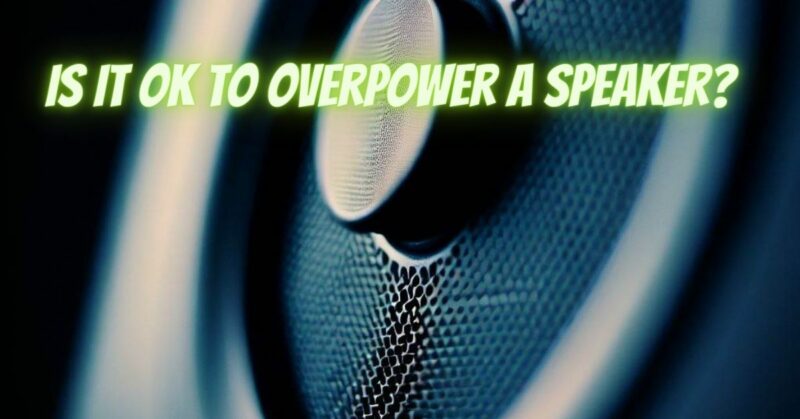In the world of audio systems, finding the right balance between power and performance is crucial. The question of whether it is acceptable to overpower a speaker often sparks debates among enthusiasts. In this article, we will explore the implications of overpowering a speaker and shed light on the potential risks and considerations involved.
Understanding Power and Speaker Ratings: Before we delve into the topic, let’s establish a foundation. Speakers are assigned power ratings, indicating the maximum amount of power they can handle. Exceeding these ratings can have consequences for both the speaker and the overall audio experience.
The Dangers of Overpowering: While it may be tempting to push speakers beyond their limits, doing so carries several risks:
- Speaker Damage: Overpowering a speaker can cause irreversible damage. Continuous exposure to power levels beyond the speaker’s rating can lead to overheating of the voice coils, which may result in voice coil burnout or even permanent damage to the speaker cone. The delicate balance between power handling and the mechanical components of the speaker can be compromised, leading to distortion, loss of clarity, or complete failure.
- Reduced Speaker Lifespan: Subjecting a speaker to excessive power can significantly shorten its lifespan. Over time, the strain caused by overpowering can accelerate wear and tear, resulting in reduced performance and potential failures. To ensure the longevity of your speakers, it is crucial to operate them within their recommended power range.
- Sound Quality Degradation: Contrary to expectations, overpowering a speaker does not always result in better sound quality. Pushing a speaker beyond its limits can introduce distortion, clipping, and other audio artifacts that degrade the listening experience. The speaker may struggle to accurately reproduce the full range of frequencies, leading to muddied sound and diminished clarity.
Balancing Power and Performance: To optimize both power and performance, it is important to find the appropriate balance:
- Match Power Ratings: Select speakers and amplifiers that are well-matched in terms of power ratings. Adhering to the manufacturer’s specifications helps ensure that the speaker can handle the power output of the amplifier without risk of damage or compromised performance.
- Consider Headroom: Allowing some headroom in power delivery can benefit the overall audio experience. A system that operates comfortably within its power capabilities ensures clean and undistorted sound reproduction, leaving room for dynamic peaks in the audio signal.
- Speaker Sensitivity: Consider the sensitivity rating of your speakers. Higher sensitivity speakers require less power to produce the same volume level as speakers with lower sensitivity. Choosing speakers with appropriate sensitivity can mitigate the temptation to overpower.
Conclusion:
While it may be tempting to push the limits, overpowering a speaker poses significant risks to its health and compromises sound quality. Exceeding power ratings can lead to damage, reduced lifespan, and degraded audio performance. To strike the right balance, it is essential to respect the power handling capabilities of your speakers and match them with appropriately rated amplifiers. By doing so, you can ensure longevity, preserve sound quality, and enjoy a rewarding audio experience without compromising the integrity of your equipment.


